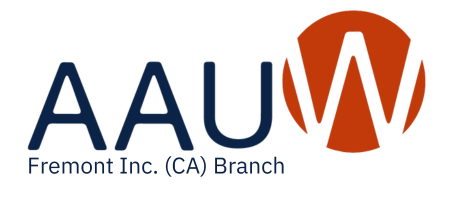Two outstanding speakers featured in fourth OBOC presentation.
by Shirley Gilbert

Speakers Kay Tierney (left) and Mary Burns (right) were given honorariums for their non-profits by Fremont Branch President Linda Pearson.
Give a man a fish and you feed him for a day; teach a man to fish and you will feed him for a lifetime.
That was the theme for the three speakers at the One Book, One Community fourth presentation in the library on Monday, February 3, 2014.
The choice for this year’s community read program was Sheryl WuDunn and Nicholas Kristof’s book Half the Sky.
The Kasimu Education Fund for Malawi
First, former Mountain View Fire Chief Robert Burns and his wife Mary talked about their efforts to bring education and a decent life to the poverty-stricken citizens of Manyesa Village in Malawi in Southeast Africa.
Malawians, said Mary Burns, are called the “heart of Africa” because of their kindness of spirit and their cooperative lifestyle. However, the people of the town are considered the poorest in the world — they live on less than $2 a day. Malawi was hard hit by the AIDS pandemic and so many of the country’s citizens died from the disease.
How did Mary and her husband get involved?
Many years ago, Mary met a Malawian man when she was going to Berkeley. He told her that one boy in 5,000 go to school in his homeland. She convinced Robert to go to south Malawi with her. And they decided to help the people of Manyesa Village.
Their first efforts were to provide scholarships for young people to go to high school. But there was no high school in the town so they built one high school classroom. Then they realized that the children had no food and because of that it was difficult to learn and concentrate. So they put together a meal program for 1400 children.
Last year, said Mary, they built their first high school and 85 children attend the high school. Pre-school children meet in the prayer house and they also supplied meals for these youngsters.
They did all this through the Kasimu Education Fund they created to help the Malawian people. In many places in Malawi there are 200 students for one teacher. In the schools the Burns’s built there are 50 children for each teacher — a great improvement. The couple also used the funds they raised to educate teachers and they want to build homes for the instructors as well.
They also engaged people around them in the Bay Area to help. Computers were donated by Mountain View and Palo Verde high school in Palo Alto donated 1700 books for the high school.
With a $1900 donation the couple granted micro loans to 35 businesses and farmers. The non-profit’s goal is to sponsor self sufficiency so that living conditions improve for the people of the village. “We’re developing,” said Robert Burns, “an exit strategy so we can leave folks as self sufficient as possible.” He said that the capital improvements made possible by their fund will end in 2015 so that Malawians can carry on after that and continue improving their lives and their finances. “We’ve always done things,” insisted Robert, “in sync with how Malawians do things. We never want to impose American ways on them.”
If you would like to learn more about the Kasimu Education fund, go to: www.kefmalawi.com
Kiva.org
Next, Kay Tierney presented the work of Kiva.org, a non-profit that grants loans to extremely poor people in developing nations.
Kay joined Kiva as a translator and editor. She edits stories about the folks who are given loans. The stories underscore how these micro loans change the lives of women and men entrepreneurs and lifts them out of poverty.
Kay explained how the concept of micro loans got started. A Bangladesh professor, Mohammad Yunus, lent $27 to 42 women — only 62 cents each — and they repaid the loan and made a two cent profit. From these humble beginnings, he founded the Grameen Bank and by 2007 his fund rose to $6.38B with 74M borrowers.
In 2006 Mohammad Yunus was awarded the Nobel Prize in economics for inventing this micro loan idea.
That’s how the idea of Kiva.org was born as well. Jessica and Matt Flannery are the couple who created online Kiva.org. They both went to Stanford. After graduation Matt joined TiVo and Jessica went to Africa to expand the micro loan idea. The couple discovered that poor people are better at paying back loans than rich people.
Kiva has loaned out $524,537,700 to date and can boast a 98 percent repayment rate. The non-profit features group loans as well and when one member of the group defaults, the group is responsible for paying theloan.
Kiva grants loans to poor people in Bangladesh, El Savador, Ghana, Uganda and many other impoverished countries. Kay added that it’s possible, once the loan is paid, to be repaid but most donors keep the money circulating to others.
As a present, Kay gives friends and family $25 gift certificates that enable them to grant loans. At the end of her presentation she handed out information about Kiva.org and asked if anyone in the room had an “x” at the back of the paper. Kris Sandoe did and won a $25 gift certificate for Kiva.org.
Go to kiva.org for more information on this non-profit organization.

